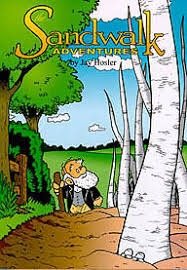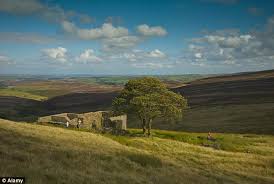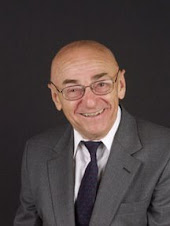Tuesday, December 15, 2015
Monday, December 14, 2015
The walking brain
Paul Salopek is taking a really long walk. His friend asks: “Aren’t you tired?”
She is referring to my project, the “Out of Eden Walk.” I’m a journalist. I’m three years into a seven-year (or eight-year — O.K., maybe nine-year) foot journey from Africa to South America. I’m reporting stories at boot level along the pathways of our species’ first Stone Age exploration of the Earth. What my friend actually means, though, is: “Aren’t you bored?”
...I take a step. And then another. Each is new. Each is a gamble. Each is a negotiation with the substantial world that occasions an immediate, irreversible and tangible reward: I do not fall. And I move forward. Or, should I fall, I must overcome the obstacle with the most primordial collaboration of all: between mind and body.
“The hunter is the alert man,” writes the Spanish philosopher José Ortega y Gasset. The hunter knows, Ortega y Gasset adds, that “the solution might spring from the least foreseeable spot on the great rotundity of the horizon.”
The walk is a hunt. It is a quality of alertness. There is something supple and deeply satisfying about this. Walking as a lifestyle is a moment-to-moment intellectual exercise that seems recollected, familiar. It electrifies the Stone Age brain that we all still carry with us: a restless brain, a brain that thirsts not just for change — our information age technology drenches us in novelty — but for tangible instead of symbolic progress. It is a brain that abhors routine. It is a brain that does not know boredom.
No, I’m not tired yet.nyt
Thursday, December 3, 2015
Friday, November 6, 2015
Study Abroad in England, July 2016
American Philosophy, British Roots: a walk across the pond
July 12-23, 2016
Among the sites we'll see and tread upon: Darwin's Down House and Sandwalk...

Henry James's Lamb House...

John Locke's Oxford...

Bertrand Russell's Cambridge...

 and much more besides. Apply at OEA SUMMER PROGRAMS
and much more besides. Apply at OEA SUMMER PROGRAMS
For more info, contact Professors Oliver or Bombardi: phil.oliver@mtsu.edu, ron.bombardi@mtsu.edu. or at http://delightsprings.blogspot.com/2015/09/study-abroad-course-july-2016-american.html
July 12-23, 2016
An on-site exploration of specific British locales associated with philosophers and writers in the modern peripatetic (“walking & thinking”), empiricist, pragmatic, and other philosophical and literary traditions who’ve influenced and been influenced by their counterparts in America.
Among the sites we'll see and tread upon: Darwin's Down House and Sandwalk...
Henry James's Lamb House...
John Locke's Oxford...
Bertrand Russell's Cambridge...
the Yorkshire Moors...
For more info, contact Professors Oliver or Bombardi: phil.oliver@mtsu.edu, ron.bombardi@mtsu.edu. or at http://delightsprings.blogspot.com/2015/09/study-abroad-course-july-2016-american.html
- Estimated program fee including lodging, daily breakfast, most ground transportation, excursions, and site visit admission fees $2,905. (Does not include airfare, other meals, tuition, insurance, EA fee, and miscellaneous personal expenses) -- Scholarships available
- 3 credit course, PHIL 3350, no prerequisites, all welcome
- All students must be pre-approved by the Office of Education Abroad prior to submitting a program application.
- More info, readings, itinerary here.
Visit our booth at the MTSU Student Union on Nov.18 between 10-2
Tuesday, November 3, 2015
Dogs!

When I go out for a walk, there is so much that makes me happy to be alive. Breathing. Not thinking. Observing. I am grateful beyond measure to be part of it all. There are people, of course, heroic and heartbreaking, going about their business in splendid fashion.There are the discarded items — chairs, sofas, tables, umbrellas, shoes — also heroic for having lived life in happy (or unhappy) homes.There are trees. Glorious and consoling. Changing with the seasons. Reminders that all things change. And change again. There are flowers, birds, babies, buildings.I love all of these. But above all, I am besotted by dogs. Maira Kalman
Take our dogs and ourselves, connected as we are by a tie more intimate than most ties in this world; and yet, outside of that tie of friendly fondness, how insensible, each of us, to all that makes life significant for the other!—we to the rapture of bones under hedges, or smells of trees and lamp-posts, they to the delights of literature and art. As you sit reading the most moving romance you ever fell upon, what sort of a judge is your fox-terrier of your behavior? With all his good will toward you, the nature of your conduct is absolutely excluded from his comprehension. To sit there like a senseless statue, when you might be taking him to walk and throwing sticks for him to catch! What queer disease is this that comes over you every day, of holding things and staring at them like that for hours together, paralyzed of motion and vacant of all conscious life? William James
Wednesday, October 14, 2015
Thoreau's mistake
A new take-down of the "hypocrite" Thoreau scores some strong points, through several selectively and unsympathetically cherry-picked criticisms. I stand by my admiration of the dawn riser who walks confidently through the world, but must confess agreement that Henry did not adequately acknowledge the value of living as well in society as in nature.
 New Republic (@NewRepublic)
New Republic (@NewRepublic)
Perhaps the strangest, saddest thing about “Walden” is that it is a book about how to live that says next to nothing about how to live with other people. Socrates, too, examined his life—in the middle of the agora. Montaigne obsessed over himself down to the corns on his toes, but he did so with camaraderie and mirth. Whitman, Thoreau’s contemporary and fellow-transcendentalist, joined him in singing a song of himself, striving to be untamed, encouraging us to resist much and obey little. But he was generous (“Give alms to everyone that asks”), empathetic (“Whoever degrades another degrades me”), and comfortable with multitudes, his and otherwise. He would have responded to a shipwreck as he did to the Civil War, tending the wounded and sitting with the grieving and the dying.
Poor Thoreau. He, too, was the victim of a kind of shipwreck—for reasons of his own psychology, a castaway from the rest of humanity. Ultimately, it is impossible not to feel sorry for the author of “Walden,” who dedicated himself to establishing the bare necessities of life without ever realizing that the necessary is a low, dull bar; whose account of how to live reads less like an existential reckoning than like a poor man’s budget, with its calculations of how much to eat and sleep crowding out questions of why we are here and how we should treat one another; who lived alongside a pond, chronicled a trip down the Concord and Merrimack Rivers, and wrote about Cape Cod, all without recognizing that it is on watering holes and rivers and coastlines that human societies are built.But,
Granted, it is sometimes difficult to deal with society. Few things will thwart your plans to live deliberately faster than those messy, confounding surprises known as other people. Likewise, few things will thwart your absolute autonomy faster than governance, and not only when the government is unjust; every law is a parameter, a constraint on what we might otherwise do. Teen-agers, too, strain and squirm against any checks on their liberty. But the mature position, and the one at the heart of the American democracy, seeks a balance between the individual and the society. Thoreau lived out that complicated balance; the pity is that he forsook it, together with all fellow-feeling, in “Walden.” And yet we made a classic of the book, and a moral paragon of its author—a man whose deepest desire and signature act was to turn his back on the rest of us. Kathryn Schulz, The New Yorker
 | Boston Review (@BostonReview) |
|
Henry David Thoreau was not an enemy of civic life (contrary to Kathryn Schulz's recent @NewYorker piece):hubs.ly/H01hnG-0
| |
 New Republic (@NewRepublic)
New Republic (@NewRepublic)
Henry David Thoreau's radical optimism: on.tnr.com/1NsN1ir pic.twitter.com/uBnk2YaWhF
 | New Republic (@NewRepublic) |
|
It's time for everyone to stop hating on Henry David Thoreau. bit.ly/207zO5J pic.twitter.com/yBPe31ZmY5
| |
==
PodcastFriday, October 2, 2015
Wallace Stevens
It's his birthday.
Not a bad way to sell insurance.Stevens walked two miles to and from work every day, and that was when he wrote most of his poetry. “I write best when I can concentrate,” he said, “and do that best while walking.” He would carry slips of paper in his pockets, and jot down notes, which he would later give to his secretary to type up for him. WA... Searching for WS
Wednesday, September 30, 2015
Talk about Walking
What a delightful Almanac poem today!
"Talk about Walking” by Philip Booth from Lifelines: Selected Poems 1950-1999 (Viking Press). Reprinted with permission.
Where am I going? I’m going
out, out for a walk. I don’t
know where except outside.
Outside argument, out beyond
wallpapered walls, outside
wherever it is where nobody
ever imagines. Beyond where
computers circumvent emotion,
where somebody shorted specs
for rivets for airframes on
today’s flights. I’m taking off
on my own two feet. I’m going
to clear my head, to watch
mares’-tails instead of TV,
to listen to trees and silence,
to see if I can still breathe.
I’m going to be alone with
myself, to feel how it feels
to embrace what my feet
tell my head, what wind says
in my good ear. I mean to let
myself be embraced, to let go
feeling so centripetally old.
Do I know where I’m going?
I don’t. How long or far
I have no idea. No map. I
said I was going to take
a walk. When I’ll be back
I’m not going to say.
"Talk about Walking” by Philip Booth from Lifelines: Selected Poems 1950-1999 (Viking Press). Reprinted with permission.
Saturday, September 12, 2015
Study Abroad course, July 2016: American Philosophy, British Roots
American Philosophy, British Roots: a walk across the pond
July 11-22, 2017 - an informational meeting will be held on October 26, 2016 on the MTSU campus in LRC 221 at 6 pm... and, visit our booth at the Study Abroad Fair in the Student Union on November 9 between 10 am and 2 pm.
Among the sites we'll see and tread upon: Darwin's Down House and Sandwalk...

Henry James's Lamb House...

John Locke's Oxford...

Bertrand Russell's Cambridge...

 and much more besides. Apply at OEA SUMMER PROGRAMS
and much more besides. Apply at OEA SUMMER PROGRAMS
For more info, contact Professor Oliver: phil.oliver@mtsu.edu or at http://delightsprings.blogspot.com/2015/09/study-abroad-course-july-2016-american.html
For more info contact phil.oliver@mtsu.edu. Apply at OEA SUMMER PROGRAMS - https://mtsu.studioabroad.com/index.cfm?FuseAction=Programs.ViewProgram&Program_ID=56043
Podcast
July 11-22, 2017 - an informational meeting will be held on October 26, 2016 on the MTSU campus in LRC 221 at 6 pm... and, visit our booth at the Study Abroad Fair in the Student Union on November 9 between 10 am and 2 pm.
An on-site exploration of specific British locales associated with philosophers and writers in the modern peripatetic (“walking & thinking”), empiricist, pragmatic, and other philosophical and literary traditions who’ve influenced and been influenced by their counterparts in America.
Among the sites we'll see and tread upon: Darwin's Down House and Sandwalk...
Henry James's Lamb House...
John Locke's Oxford...
Bertrand Russell's Cambridge...
the Yorkshire Moors...
For more info, contact Professor Oliver: phil.oliver@mtsu.edu or at http://delightsprings.blogspot.com/2015/09/study-abroad-course-july-2016-american.html
- Estimated program fee including lodging, daily breakfast, most ground transportation, excursions, and site visit admission fees $2,375. (Does not include airfare, other meals, tuition, insurance, EA fee, and miscellaneous personal expenses) -- Scholarships available, contact the Education Abroad office educationabroad@mtsu.edu, Peck Hall 207 - (615)898-5179
- 3 credit course, PHIL 3350, no prerequisites, all welcome
- All students must be pre-approved by the Office of Education Abroad prior to submitting a program application.
Visit our booth at the Student Union on Nov.18 between 10-2
This course revives a tradition originally rooted in Aristotle’s ancient school in Athens, the Lyceum, whose students by legend were said to have roamed the campus grounds with their mentors during classes. Many philosophers and writers since have extolled the benefits of ambulatory thinking, and Britain in particular continues to nurture a vibrant walking culture whose leading lights have included philosophers like John Locke, John Stuart Mill, and Bertrand Russell, novelists like Charles Dickens, George Eliot, and Jane Austen, and poets like Wordsworth, Shelley, Coleridge and Keats.
Across the pond, meanwhile, prominent American peripatetics like Emerson, Thoreau, and William James have advanced novel versions of naturalism, transcendentalism, and pragmatic empiricism that both extend and confound their British ancestors. The resulting Anglo-American dialogue is rich in implication for the future development of all those traditions. The connecting thread is walking. We will follow in the footsteps of some of the British figures most closely linked with these traditions and that development, and interrogate their ideas in the style and manner that first gave them breath.
Our method will involve selected readings, specific questions pursued on the very ground where targeted British figures first conceived the ideas under scrutiny, and an opportunity for students to participate in the process of trans-Atlantic intellectual cross-pollination.
Before, during, and after each site visit, students will emulate the peripatetic method of discourse by splitting into small roving conversational groups of two or three to discuss issues prompted by assigned readings, discussion, and site-visit content. Each will then post summaries of their conversations and subsequent reflections on a blog-site created specifically for the course. They will then continue to engage with the instructor(s) and one another in ongoing face-to-face discussions and online discussion threads that will ultimately provide the core basis for a final written project directed by the instructor(s) and posted by each student within two weeks of our return.
Readings Students will read selections from the following texts, either in print or etext versions.
- Amato, On Foot: A History of Walking - “Mind over Foot: Romantic Walking and Rambling,” pp.101-124; “The Transformation of Walking from Necessity to Choice,” 255-278
- Coverley, The Art of Wandering - “The Writer as Walker” & “The Walker as Philosopher,” 11-38; “The Return of the Walker,” 205-231
- Dewey, Art as Experience and "The Influence of Darwinism on Philosophy"
- Gilbert et al (ed.), The Walker’s Literary Companion
- Gros, “A Daily Outing-Kant,” and “Strolls,” in A Philosophy of Walking,153-167
- Horowitz, On Looking (tba)
- Hosler, [Darwin’s] Sandwalk Adventures
- James, The Meaning of Truth (tba)
- James (Henry & William), selected letters (tba)
- Minshull (ed.), The Vintage Book of Walking - “Why Walk,” pp.1-28; “Walk With Me,” 239-269
- Mitchell (ed.), The Joys of Walking - Stephen, “In Praise of Walking,” 18-38; Dickens, “Night Walks,” 43-56, and “Tramps,” 95-112; Trevelyan, “Walking,” 57-79; Hazlitt, “On Going a Journey,” 86-94
- Nicholson, The Lost Art of Walking, on London, 86-113; “Walking Home and Away From Home,” & “Perfect and Imperfect Walks, Last Walks, and Walks We Didn’t Take,” 217-261
- Orlet, “Gymnasiums of the Mind” in Philosophy Now, issue 44
- Russell, An Inquiry Into Meaning and Truth: the William James Lectures
- Russell, The Conquest of Happiness (tba)
- Schiller, Essays in Humanism - Preface; “Truth,” 44-61; “Reality and ‘idealism’,” 110-127, “Darwinism and Design,” 128-156, “The Place of Pessimism in Philosophy,” 157-165
- Solnit, “The Mind at Three Miles an Hour” in Wanderlust: A History of Walking, pp.14-29
- Sprigge, American Truth, British Reality - “Introduction,” 1-6; “Bradley contra James,” 363-370; “Conceptual Thinking as Distortive of Reality: James and Bradley,” 434-438; “Darwinist Critique of Christianity,” 558-561; Conclusion, 573-583
- Thoreau, “Walking”
- Toibin, The Master
In the weeks prior to departure, students will be expected to read Orlet, Solnit, and Thoreau, and as many of the paired readings below as they can manage. Additional pairings of text(s) and locale(s) may be appended during the course, in response to conversations and circumstances “on the ground”.
Itinerary & paired readings
Tue. Jul 12, 2016 Guide - will meet group members in arrival hall of London Heathrow airport and accompany them to hotel with a 2-hour panoramic tour en-route. Private minicoach - will arrive at London Heathrow airport and provide transfer to hotel with a full-day city tour en-route. Admission: Strawberry Hill (Horace Walpole’s Gothic Castle).
Admission: Dickens House (maximum of 15 people can visit at one time - 30min interval between timeslots - 1-1.5hrs duration per time slot) hrs 10am - 5pm. 3 Star Hotel Standard Room such as Bayswater Inn, Queens Park Hotel, Royal Eagle Hotel, Central Park, London, England. READ: Dickens, in The Joys of Walking
Wed. Jul 13, 2016 Breakfast included. Please check with hotel reception for specific times. London Oyster Card £20 Including Activation Fee. Admission: Highgate Cemetary (about 90 min total for tour of West Side and browsing East Side on own - grp tours only available weekday mornings and very limited availability). Admission: Keats House (prebooked groups Tuesday - Friday 10am to 12pm). Admission: Freud House (suggested to allow 1.5 hrs for visit - opening hours Wed - Sun 12 - 5pm). 3 Star Hotel Standard Room such as Bayswater Inn, Queens Park Hotel, Royal Eagle Hotel, Central Park, London, England. READ: “Mind over Foot: Romantic Walking and Rambling,” in Amato.
Thu. Jul 14, 2016 Breakfast included. Please check with hotel reception for specific times. Private minicoach - will arrive at hotel and provide a full-day excursion to Kent and Sussex. Admission: The home of Charles Darwin (Down House). Admission: Lamb House. Admission: Restoration House, Rochester (the Satis House of Dickens' “Great Expectations”, the home of Miss Havisham). 3 Star Hotel Standard Room such as Bayswater Inn, Queens Park Hotel, Royal Eagle Hotel, Central Park, London, England. READ: Hosler, [Darwin’s] Sandwalk Adventures; James (Henry & William), selected letters (tba); Dickens, “Tramps,” in Mitchell.
Fri. Jul 15, 2016 Breakfast included. Please check with hotel reception for specific times.
Private minicoach - will arrive at hotel and provide a full-day excursion to Cambridge. Guide - meets group in Cambridge and provides a half-day walking tour. 3 Star Hotel Standard Room such as Bayswater Inn, Queens Park Hotel, Royal Eagle Hotel, Central Park, London, England. READ: Russell, An Inquiry Into Meaning and Truth: the William James Lectures, and The Conquest of Happiness (tba).
Sat. Jul 16, 2016 Breakfast included. Please check with hotel reception for specific times. Free day - Optional trip to Paris for the day. 3 Star Hotel Standard Room such as Bayswater Inn, Queens Park Hotel, Royal Eagle Hotel, Central Park, London, England.
Sun. Jul 17, 2016 Breakfast included. Please check with hotel reception for specific times. Group makes own way to Bradford by train and then by public transit to local area attractions. Admission: Bronte Society and Bronte Parsonage Museum plus guided walk, Haworth. Taste of the Moors Walk - Approx 1.5 hours with guide (readings from Wuthering Heights) - Groups over 20 will be split into 2 groups. 3-4* hotel standard room such as The Dubrovnik Hotel, Bradford, England. READ: “The Writer as Walker” & “The Walker as Philosopher,” in Coverley.
Mon. Jul 18, 2016 Breakfast included. Please check with hotel reception for specific times. Group makes their own way by train to Stratford Upon Avon. 3 Star Hotel Standard Room such as Best Western Grosvenor, White Swan, Stratford-Upon-Avon, England. READ: The Walker’s Literary Companion (tba)
Tue. Jul 19, 2016 Breakfast included. Please check with hotel reception for specific times.
Admission: Shakespeare's Trust, entry to 2 properties. Group makes their own way to Oxford via train. 3 Star Hotel Standard Room such as Holiday Inn Express Oxford - Kassam Stadium, Oxford, England. READ: “Why Walk,” “Walk With Me,” in Minshull.
Wed. Jul 20, 2016 Breakfast included. Please check with hotel reception for specific times. 3 Star Hotel Standard Room such as Holiday Inn Express Oxford - Kassam Stadium, Oxford, England.
Thu. Jul 21, 2016 Breakfast included. Please check with hotel reception for specific times.
No transportation included. Guide provides morning walking tour in Oxford (Lewis Carroll orientated). Admission: Christ Church. Free afternoon in Oxford. 3 Star Hotel Standard Room such as Holiday Inn Express Oxford - Kassam Stadium, Oxford, England. READ: John Locke (tba); Lewis Carroll (tba)
Fri. Jul 22, 2016 Breakfast included. Please check with hotel reception for specific times.
No transportation included. Free day in Oxford. 3 Star Hotel Standard Room such as Holiday Inn Express Oxford - Kassam Stadium, Oxford, England. READ: Schiller, Essays in Humanism (tba); Sprigge, American Truth, British Reality (tba)
Sat. Jul 23, 2016 Breakfast included. Please check with hotel reception for specific times.
Transfer from oxford hotel to LHR via private minicoach.For more info contact phil.oliver@mtsu.edu. Apply at OEA SUMMER PROGRAMS - https://mtsu.studioabroad.com/index.cfm?FuseAction=Programs.ViewProgram&Program_ID=56043
Podcast
Subscribe to:
Posts (Atom)




 Charles Darwin (
Charles Darwin (










